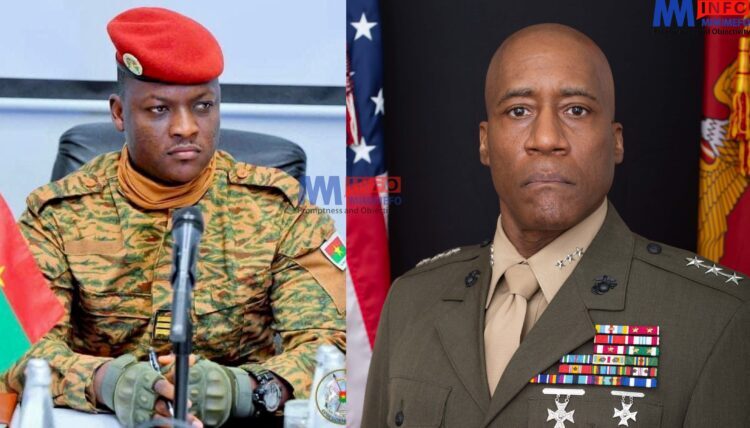General Michael Langley, the commanding officer of U.S. Africa Command (AFRICOM), characterized the Sahel as the “epicenter of terrorism on the globe.”
The Sahel countries includes, Senegal, Mauritania, Mali, Burkina Faso, Niger, Chad, Nigeria, Sudan, Guinea, and Eritrea. The G5 Sahel (French: G5 du Sahel) is a regional organization established in 2014 by Burkina Faso, Chad, Mali, Mauritania, and Niger.
On May 30, Marine Corps General Michael Langley, Commander of U.S. Africa Command (AFRICOM), identified the Sahel as the “epicenter of terrorism on the globe.” This assertion was made during a digital press briefing at the 2025 African Chiefs of Defense Conference, a critical forum where military leaders convene to confront significant security challenges throughout the continent. According to Langley, the deteriorating security situation threatens not only the nations directly impacted but also presents considerable risks to global security, including that of the United States.

“Our intention going into Burkina Faso was to help rescue the country from the hunter regime and to restore peace for its people,” ~ General Michael Langley
General Langley’s statement, made in an exclusive interview in Kenya, suggests that the US military intervention in Burkina Faso is aimed at restoring peace and rescuing the country from what he terms a “hunter regime,” while respecting the nation’s sovereignty.
Key Points from General Langley’s Statement:
- Intervention Aim: The primary goal of the US involvement is to help Burkina Faso escape the “hunter regime” and re-establish peace for its citizens.
- Motivation: The intervention is driven by the desire to support the people of Burkina Faso and not by ulterior motives that some Africans might suspect.
- Respect for Sovereignty: Despite the intervention, the US acknowledges and respects Burkina Faso’s
The “hunter regime” in Burkina Faso refers to the military junta led by Ibrahim Traoré, who assumed power following a coup in September 2022. He is recognized as one of the youngest heads of state worldwide and has garnered support from Africans and the global black diaspora. Africa has long suffered under the burden of corrupt leadership, often bolstered by Western interests that have exploited the continent’s natural resources, redirecting them to the United States and Europe. The Sahel region, now labeled as the epicenter of global terrorism, has witnessed its leaders being held accountable in favor of the populace, advocating for the utilization of African natural resources to foster the development of their nations and their citizens. In the case of Burkina Faso, significant progress and growth have been observed since Ibrahim Traoré took office.
Contextualizing the Statement:
- US Involvement: The US has a history of providing security assistance to Burkina Faso, including funding, weapons, and training. However, this assistance has been debated, with some arguing it may have inadvertently contributed to the instability.
- Burkina Faso’s Political Situation: Burkina Faso has experienced significant political instability in recent years, including two military coups in 2022.
General Langley characterized the Sahel, including Mali, Burkina Faso, and Niger, as a crucial zone of ongoing conflict and rising instability. He noted that terrorist organizations linked to Al-Qaeda and ISIS have intensified activities, with groups like Al-Qaeda in the Islamic Maghreb expanding since 2022. The situation in Burkina Faso is particularly alarming, as the Burkinabe government has lost control over significant territories. Langley warned that these groups aim to extend their reach into West Africa’s coastal countries, such as Ghana, Côte d’Ivoire, and Benin, potentially increasing revenues through illicit activities and threatening U.S. homeland security.

“We are monitoring this closely because they could develop the capacity to threaten the homeland,” Langley said.
AFRICOM outlines the challenges in Africa.
The briefing notably recognized the significant obstacles encountered by AFRICOM due to the U.S. troop withdrawal from Niger following the military coup in 2023. This withdrawal has severely restricted the U.S. military’s capacity to monitor terrorist activities and execute counterterrorism operations in the region.
But the people in Burkina Faso disagree. They cite many developments happening in the country since Ibrahim Traoré took power, highlighting significant improvements in infrastructure, education, and public health services that have positively impacted their lives. Many locals express optimism about the future, emphasizing the government’s efforts to stabilize the economy and create job opportunities for the youth. Furthermore, they point out the increased focus on agricultural initiatives aimed at boosting food security, which have been crucial in a region that often faces challenges in this area. The sentiment among the populace reflects a belief in the potential for sustainable growth and advancement, fostering a sense of hope and unity amidst the ongoing challenges that the nation faces.
